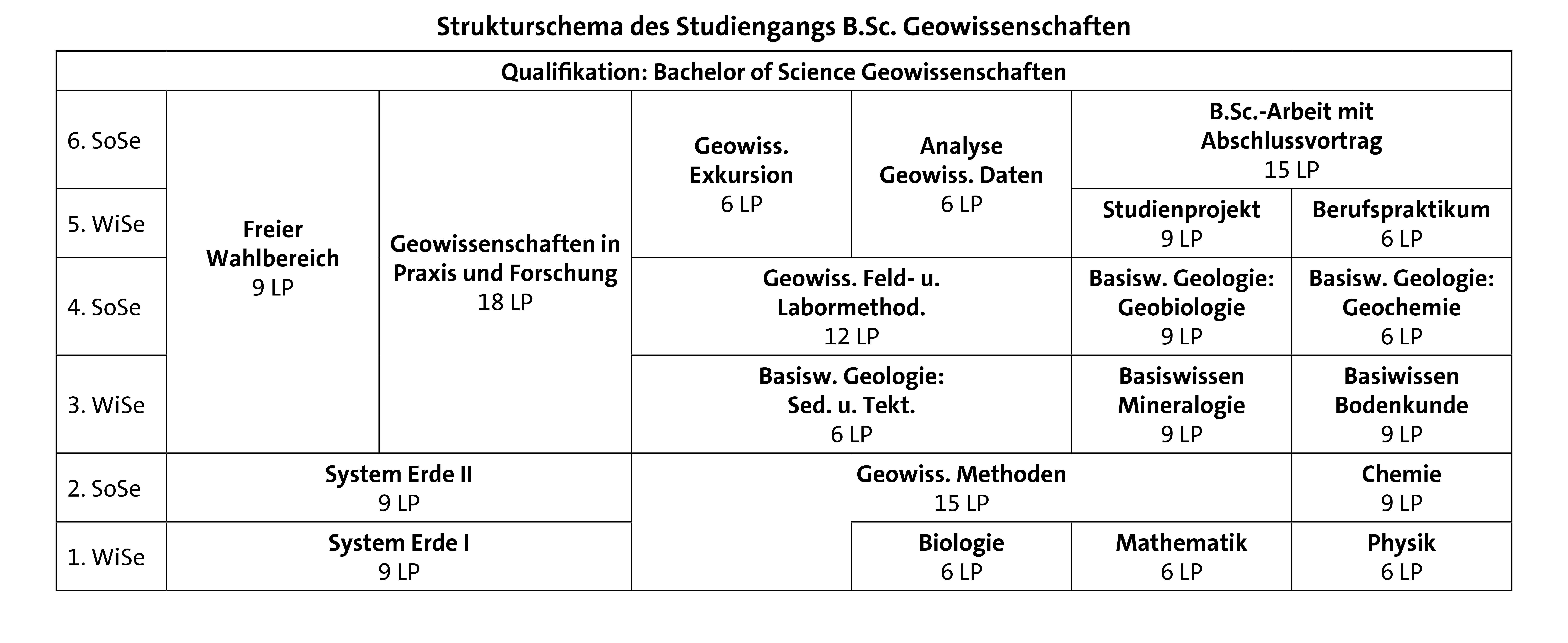B.Sc. Geosciences
Description of the study programme
The Bachelor's programme in Geosciences (B.Sc.) at the Universität Hamburg offers an interdisciplinary natural science study programme with high application relevance for your professional career. The qualification objectives are:
- Knowledge of processes, dynamics, structure and development of the Earth
- Assessment of marine and terrestrial systems for climate and geomaterials research
- Acquisition of theoretical and methodological basics of the geosciences and their current research fields (e.g. in climate or geomaterials research)
- Analysis of interactions between the spheres of the Earth system and between humans and the environment
- Concept development for sustainable use of natural resources
- Ability to reflect on science policy and societal decisions related to the Earth system
The Bachelor’s programme in Geosciences is unique in this form in Germany, as it is interdisciplinary and is supported by the departments of Geology, Soil Science and Mineralogy of the Department of Earth Sciences.
The interdisciplinary study programme offers both theoretical and practical learning content, both in lectures and seminars and in excursions, field exercises and practical courses. It lays the foundations for further academic study (Master's and doctoral studies).
Students can specialise in Geology, Crystallography, Soil Science, Petrography, Palaeobiology and Geochemistry or combine several of these specialisations. In any case, they gain a system understanding of the Earth.
Career prospects
The degree B.Sc. Geosciences qualifies you for an interesting, versatile professional life such as in nature conservation and environmental offices, in federal and state authorities, in engineering offices and environmental technology companies, in industrial companies e.g. in the chemical industry, materials testing and building materials production, in the public relations of companies and institutes or in research.
Other fields of work include planning and assessment of construction projects, environmental impact assessments, coastal management studies, assessment of geohazards, monitoring of sediment movements, exploration of deposits or forecasts on current issues in climate research.
Outlook for Master’s programmes
Following the Bachelor's degree, you can study the two-year Master's programme M.Sc. Geosciences with the specialisation subjects Mineralogy, Geology and Soil Science.
Structure of the study programme
The programme comprises six semesters and is structured as follows:
- Introduction: Fundamentals of geosciences and natural science propaedeutics
- Build-up: Basic knowledge of the geoscientific disciplines
- Deepening: Practicals and exercises, mapping exercise and excursion
- Interdisciplinary supplementation: Freely selectable modules of neighbouring subjects for meaningful supplementation and deepening
- Career orientation: Interdisciplinary study project and professional internship
- Completion: Bachelor thesis with presentation

Superordinate examination regulations (for all MIN study programmes leading to the B.Sc. degree) (in German)
- Version of 16.06.2021 (PDF)
- Amendment of 31.01.2018 (PDF)
- New version of 11.04.2012 and 04.07.2012 (PDF)
- First version of 30.05.2005 with amendment of 30.06.2005 and 05.07.2006 (PDF)
Subject-specific regulations (in German)
- Version of 21.04.2021 (PDF) (Applies to students starting their studies from WS 2021/22 onwards)
- New version of 27.02.2019 (PDF) (Applies to students starting their studies from WS 2019/20 onwards)
- New version of 08.11.2016 (PDF) (Applies to students starting their studies from WS 2016/17 onwards)
- New version of 02.06.2010 (PDF) (Applies to students starting their studies from WS 2011/12 onwards)
- Amendment of 02.06.2010 (PDF)
- Amendment of 01.10.2008 (PDF)
- First version of 11.04.2007 and 22.08.2007 (PDF)
Related links (in German)
Offers for study orientation
Extensive advising for prospective students
Study films
Deutsche Forschungsgemeinschaft 2016: KlimaTaucher – Von Klima und Fußball (in German)
Lecture series: What to study and for what?
- Video 2016 (in German): „Böden sind mehr als Dreck – warum das Studium der Geowissenschaften mit Schwerpunkt Bodenkunde so aktuell ist“
- Video 2015 (in German): „Fit ins Studium – Mathematik als Grundlage für ein erfolgreiches Studium an der MIN-Fakultät“
- Video 2012 (in German): „Die Bedeutung der Geologie in Gesellschaft und Wirtschaft“
- Video 2011 (in German): „Böden – die dünne Haut unserer Erde“
- Podcast 2008 (in German): „Vom geologischen Untergrund Hamburgs zur Geodynamik der Anden“
- Podcast 2007 (in German): „Böden – die dünne Haut unserer Erde“
Application
Admission requirement:
Abitur (or comparable school-leaving qualification for applications from abroad)
Application and application information:
You apply directly to the Universität Hamburg for this study programme.
The International Guide helps prospective international students with their application.
Application period:
1 June - 15 July
Admission: each winter semester
Enrolment deadlines following the electronic dispatch of admission notices:
for a winter semester: approx. mid-August (the exact dates can be found in the admission notice).
